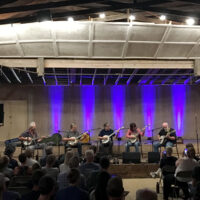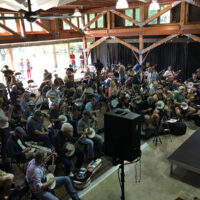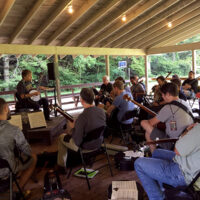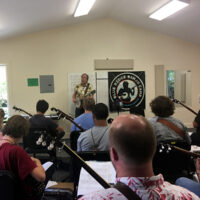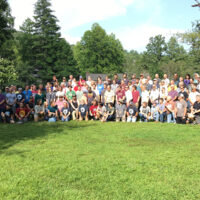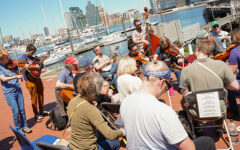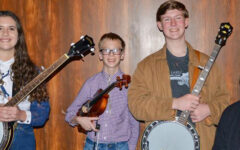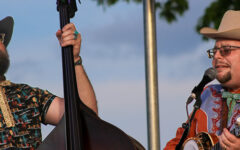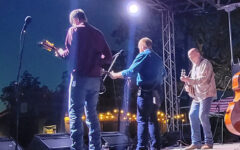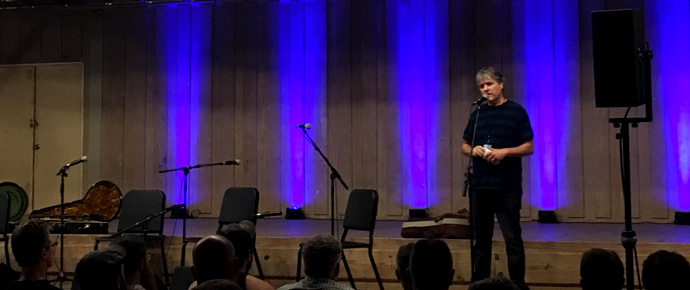
Béla Fleck welcomes the class at the 2018 Blue Ridge Banjo Camp – photo by Brian Swenk
“Immerse yourself.”
If there was one consistent theme to the inaugural Béla Fleck Blue Ridge Banjo Camp, it wasn’t necessarily the technical mechanics of banjo wizardry, but more of how we expand art and passion in our conscious daily lives. There is a focus on how to use an instrument like the banjo to learn self-discipline, dedication, and the joyous expression of art to become better people, better friends, and better artists.
The first (of hopefully many) Blue Ridge Banjo Camps took place at the scenic Brevard Music Center last week, as nearly 100 banjo players arrived ready to sit at the feet of masters and become “immersed” in all things bluegrass banjo for three straight days.
Coming from as far as New Zealand, Australia, and Switzerland, students of all ages (the youngest was 11 years old!) arrived Wednesday evening to check in, have a quick dinner, meet their fellow camp mates, and find a seat in one of the open air performance spaces and await one of their heroes, Béla Fleck.
Woody Platt, guitarist and singer for the Steep Canyon Rangers and one of the camp organizers, welcomed everyone and told the story of the moment he was standing with Béla after a performance and said, “You know… we should do a banjo camp!” There are few people who could take that kernel of an idea and turn it into a multi-national reality within a year, but Woody Platt and Béla Fleck are two of the hardest working musicians you’ll ever meet.
As Béla got up and welcomed the students, he explained that his goal for everyone, regardless of skill level, was to find both meaningful short-term and long-term takeaways, and to not become overwhelmed at the amount of information. He wanted everyone to relax and become immersed in the entire experience.
Béla introduced the other camp instructors in an autobiographical context of his own experience learning the banjo. For Béla, it all started hearing the theme song for The Beverly Hillbillies on TV one day. “I heard Earl Scruggs playing that melody and it was just all over for me!” His first banjo teacher got so frustrated with Béla asking to learn Tony Trischka songs that he finally handed Béla Tony’s phone number and said, “He lives in the Bronx, you should just start going to him.” Béla explained that Tony was so cutting edge back then, he took all the flack for not playing the banjo “right.” He thanked Tony for taking so much heat, so that when he started recording and performing, people were not as shocked about this entirely new way to play the instrument.
Béla then introduced Steve Cooley from Kentucky. While Tony taught Béla the outer limits of playing creatively, Steve taught him the deeper meanings and techniques of the Scruggs/Crowe style. “Steve broadened my understanding of that style, much more than I could find up in New York. Back then, you couldn’t just pull up a video of the different styles of the southern banjo players, so you had to find someone that had a deeper understanding of the Scruggs style, and Steve was able to show me that.”
Mike Munford was introduced next. Winner of the 2013 IBMA Banjo Player of the Year award, Mike plays with the award winning Frank Solivan and Dirty Kitchen. Béla described him as a banjo “set-up” master, and a tangential conversation ensued about the complexities of setting up a banjo to perform in all parts of the world. The impromptu conversation/story was easily one of the highlights of the camp, as the instructors all had moments of remembering random stories about people like John Hartford, Earl Scruggs, Don Reno, etc. that they would stop and share in the moment. The freedom to tell unplanned stories about the bluegrass greats was worth the price of admission. For example, did you know that John Hartford was buried in a Batman cape? Neither did I, but Béla telling the story in the middle of the evening festivities is something I’ll never forget.
Kristen Scott Benson was the last instructor to be introduced, and Béla explained that not only is she an amazing player and four-time IBMA Banjo Player of the Year, but she’s such an amazing teacher that Béla was able to pick out her students in their audition videos because of the solid fundamentals and timing they showed.
The five instructors then took turns leading some of their favorite songs for the class. One of the highlights of this first night was Béla and Tony playing Green Willis and Whiskey Before Breakfast on top of each other. And if that wasn’t enough, they got the other instructors to join them as they added St. Anne’s Reel to the mix, playing each tune as a counterpoint to the others and then eventually playing all three together at the the same time. One would think it would be a cacophony of notes, but surprisingly to everyone in attendance it worked and sounded much better than expected. The 5-piece banjo band then rolled through some Scruggs standards including, Bugle Call Rag, Groundspeed with 3-part instrumental harmonies, as well as Foggy Mountain Special, with each instructor stretching out and showing some jazz chops.
Another highlight was Kristen Scott Benson and Mike Munford leading an older Fleck tune called Eager and Anxious. This song was recorded with his old group Spectrum and has a unique sound, as it’s in the key of Bm with the 5th string lowered to F#.
Banjo Camp showcased the striking contrast of the overplayed stereotype of banjo players being “dumb” and the reality of how incredibly intelligent and educated so many of these players are. From jazz performance degrees (Adam Larrabee of the band Love Canon) to adjunct professors at UNC Chapel Hill (Hank Smith, founding member of Hank, Pattie, and The Current) to Bach on the banjo expert John Bullard, who demonstrated Prelude from Violin Partita No 3. The knowledge and curiosity of the students was palpable as the students started discovering each other’s strengths and experiences. The term “banjo nerd” was used often and endearingly, as it did seem to accurately describe the overall passion that was inherent in each and every player.
The morning session of the first day included the entire camp as Béla took the stage overlooking the idyllic pond on the grounds. Using an app on his phone and without any explanation, he played an Indian style drone, usually played on a tambura, and then proceeded to play through an Indian influenced “raga.” A raga is played in three distinct tempos using a specific scale, in this case a G pentatonic but replacing the E with an F#, and the goal is to slowly reveal each note as you move up the scale. Lasting at least ten minutes, the effect was mesmerizing and meditative. Béla explained the concepts behind the form and how he approaches the process of “revealing” notes as he goes. For him, the raga is the “sound of tonality” and it has a freedom of escaping both song and rhythm. Again, it is moments like these that are worth the time and money to be part of this experience. Béla is so engaged, curious, and intellectual about everything he does, and it is an amazing experience to be in the same room and hear him explain the hows and whys of playing Indian music forms on the banjo.
The discussion of rhythm forms led Béla to discuss the idea of metronomes and how they can be both important but also restrictive. “If music has absolute perfect timing, then you’re missing something,” said Béla. “The best music is rarely metronomic. All of the music I love has the musicians ‘listening’ to each other and being flexible to the ebb and flow of the timing.”
The students broke into five groups for the next three days, each group would have a “block” with each teacher, ultimately spending two sessions with every teacher. The teaching style of each instructor made each class unique and interesting, from the slow determined style of Béla, to the quirkiness of Tony Trischka (breaking out fantastic Don Reno stories), and the easily relatable Kristen Scott Benson. Each instructor dug into the abilities of each class, starting with basic fundamentals and slowly working their way to advanced concepts.
There’s a certain magic about Béla Fleck that’s so much more than the sum of his playing, recording, and performances. People outside of this unique “banjo world” tend to notice it when watching the movie chronicling his journey through Africa, Throw Down Your Heart. Mention Béla to someone outside our world and that’s a common reaction, “Have you seen the Africa movie?” The movie allows people to see who he is as a person, beyond the stage, and there’s a magnetic quality to how he engages life as a whole that is undeniably compelling and attractive.
You can spend your life learning notes, writing songs, and playing shows, but Béla Fleck has the curiosity and passion for learning and growing that is rare in life; it is those qualities that make this camp an unforgettable experience for 100 banjo students from around the world. Many, if not most, of the students expected to walk away with some blazing technical tricks that would produce a “wow factor” at their next show or jam session—and they will—but the unexpected long-term takeaway is a newly-discovered passion for the instrument and the music.
All attendees left with a rediscovered desire to practice fundamentals, to learn new songs, to write creative new music, and to listen to the music around us with a deeper sense of appreciation. We learned to wake up and engage each day as an opportunity to learn and grow and allow art to make our communities a better place. These students that traveled from around the world, or even just from North Carolina, to attend a summer banjo camp probably weren’t thinking of these things as they arrived, but by sitting and listening to five instructors who lived and breathed music for three days, they quickly realized that being passionate about the banjo is so much more than just practicing an instrument.
Adam Larrabee, banjoist for Love Canon, summed up the experience, “I think the best analogy is Willie Wonka and the Chocolate Factory. We all got golden tickets and were allowed to enter the ‘factory’ for the first time and see how the music was made. It was magical and happened in an incredibly beautiful setting. Huge credit is due to Woody Platt and John Felty for conceiving of it, and all the other faculty and staff for making it seamless—especially for a first-time camp. But extra special thanks to Béla for curating and overseeing the quality control down to the most minute detail and especially for being willing to share his time and energy. A huge undertaking and an undeniable success! I will be back every year—if i can pass the audition!”

